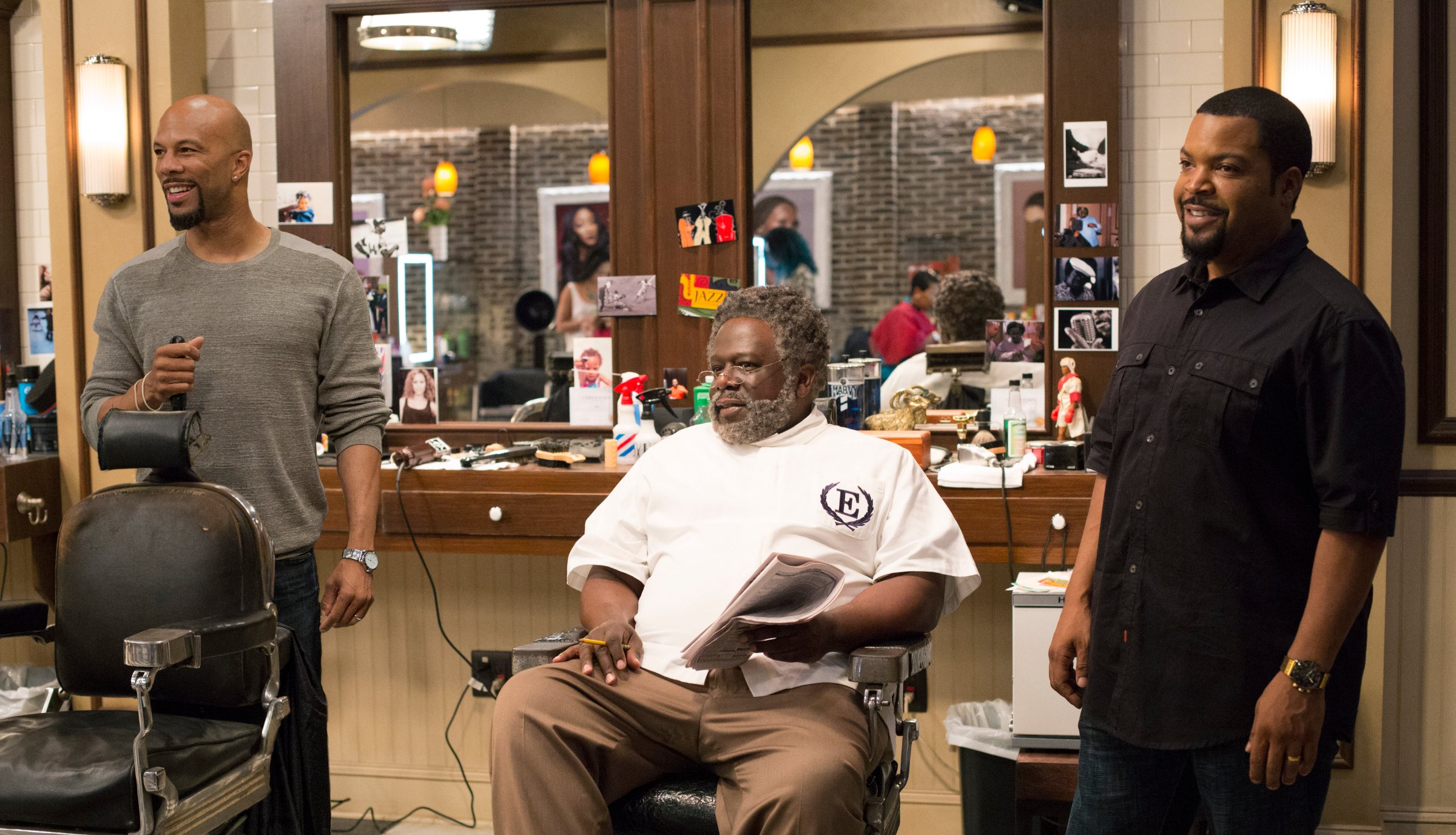
Today there’s no place, either in real life or on social media, where you can talk about anything under the sun—race, politics, sex, religion, pop culture—and not get yourself into trouble. That’s what makes Malcolm D. Lee’s Barbershop: The Next Cut so freeing, and such a pleasure. The pacing is noodly—you’d never look at this movie as a model of perfect structure—and the plot mechanics sometimes creak. But like the movies that preceded it, the ebullient Barbershop (2002) and its rather clumsy follow-up, Barbershop 2: Back in Business (2004), The Next Cut is less about plot than about communication and conversation, offering a sense of promise that the air can be cleared if we just talk to each other. It’s also filled with life: If the characters in The Next Cut, most of whom are African American, struggle with racial politics and socioeconomic pressures—not to mention the terrible reality that their friends and family are in constant danger of being killed, either by one of their own or by a cop—they also wrestle with the regular day-to-day stuff. A strained marriage might open the door to an affair. A good kid might be unduly influenced by a “bad” one. A single woman is having a devil of a time finding a good man. The Next Cut wrangles with all of it, not so much looking for the answers as opening cracks of light from which answers might emerge.
It’s also, incidentally, likely to make you laugh. Ice Cube returns as Calvin, the proprietor of a barbershop on Chicago’s South Side—he inherited the place from his father, and it’s always been a spot where the locals could gather and gossip. Nearly all of the cast members from the first two movies have returned, including Cedric the Entertainer’s snoozy, elderly barber Eddie, a mumbling (and generally hilarious) one-man Greek chorus, and Deon Cole’s Dante, a customer who has pretty much moved into the joint. (At one point he mounts a lonely and ill-advised, but very funny, defense of R. Kelly.) But the shop’s location, rife with gang violence, has become more dangerous than ever, and he fears for the well-being of his teenage son, Jalen (Michael Rainey Jr). Should he move his establishment to another part of town?
Despite the troubles, business is booming. Calvin has teamed up with beauty-shop proprietor Angie (Regina Hall) to cut costs and increase traffic. But the presence of so many women in this once mostly male enclave has created a few problems: Unapologetically bodacious hairstylist Draya (Nicki Minaj, saucy and delightful, with a voice the texture of Pop Rocks) has her eye on one particular barber on the other side of the shop, Common’s Rashad. Rashad’s wife, Terri (Eve)—long the shop’s only woman barber—is having none of it.
Sexual tension isn’t the only thing crackling. Calvin’s shop is a place where people drop in and talk about everything: neighborhood shootings (there are a few tense moments when rivals find themselves in the shop at the same time—Lee infuses these exchanges with genuine menace); city-planning “improvements” that are actually the opposite; the reality that, when you’re black, working hard isn’t always going to afford the life you want for yourself or your children.
Director Lee is, incidentally, the cousin of Spike, who late last year released his own movie about (among other things) violence in modern Chicago, the glorious Chi-Raq. Malcolm D. Lee’s approach is looser and more casual, but it’s potent in its own way. He’s also the director of the 1999 Best Man and the 2013 Best Man Holiday pictures that might be considered by marketing types to be “for” audiences of color. But they’re really for everybody: Part comedy, part soap opera, they wrap almost everything in life—love, sex, money, jealousy, interracial romance, mortal illness, childbirth—in their mighty embrace.
Barbershop: The Next Cut is for everybody too, and not just because we all need to think about race in this country—the ways in which it divides us, and the ways in which it shouldn’t. This Barbershop is simply a place where we can all laugh together, sometimes at ideas that veer close to being explosive. At one point, the shop’s only South Asian barber, Raja (Utkarsh Ambudkar), uses the term “non-negro” in a fairly benign context and catches himself. “Can I say that?” he asks, facing the others’ sudden silence. Cedric’s Eddie speaks up: “Say it slow, so we can hear all the syllables.” The tension breaks, and the air becomes clear again—maybe because in order to laugh, you need to be able to breathe first.
More Must-Reads from TIME
- Why Trump’s Message Worked on Latino Men
- What Trump’s Win Could Mean for Housing
- The 100 Must-Read Books of 2024
- Sleep Doctors Share the 1 Tip That’s Changed Their Lives
- Column: Let’s Bring Back Romance
- What It’s Like to Have Long COVID As a Kid
- FX’s Say Nothing Is the Must-Watch Political Thriller of 2024
- Merle Bombardieri Is Helping People Make the Baby Decision
Contact us at letters@time.com